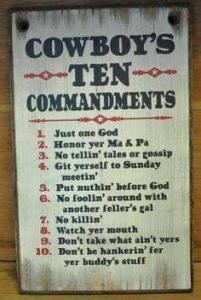The Ten Commandments
They are found in Exodus 20, verses 1-17. God spoke a specific set of words for Moses to pass on to the Israelites. Ten commands that sum up the heart of Torah, which is to love God with all our hearts, our souls and our minds, and to love our neighbors as ourselves.
So why do people find it acceptable, even cute, to create “personalized” sets of commands?
Cowboy’s Ten Commandments?
For example, a few days ago, I was scrolling on Facebook and saw a post titled “Cowboy’s Ten Commandments.” And the commands that followed were not only paraphrased to be cute, even funny, but became heretical in their interpretation and were not even in the proper order. They read like this:

- Just one God
-
Honor yer Ma and Pa
-
No tellin’ tales or gossip
-
Git yerself to Sunday meetin’
-
Put nuthin’ before God
-
No foolin’ around with another fella’s gal
-
No killin’
-
Watch yer mouth
-
Don’t take what ain’t yers
-
Don’t be hankerin’ fer yer buddy’s stuff
What Did God Tell Moses?
Now let’s read what the Lord actually told Moses in Exodus 20:
And God spoke all these words: 2 “I am the Lord your God, who brought you out of Egypt, out of the land of slavery. 3 “You shall have no other gods before me. 4 “You shall not make for yourself an image in the form of anything in heaven above or on the earth beneath or in the waters below. 5 You shall not bow down to them or worship them; for I, the Lord your God, am a jealous God, punishing the children for the sin of the parents to the third and fourth generation of those who hate me, 6 but showing love to a thousand generations of those who love me and keep my commandments. 7 “You shall not misuse the name of the Lord your God, for the Lord will not hold anyone guiltless who misuses his name. 8 “Remember the Sabbath day by keeping it holy. 9 Six days you shall labor and do all your work, 10 but the seventh day is a sabbath to the Lord your God. On it you shall not do any work, neither you, nor your son or daughter, nor your male or female servant, nor your animals, nor any foreigner residing in your towns. 11 For in six days the Lord made the heavens and the earth, the sea, and all that is in them, but he rested on the seventh day. Therefore the Lord blessed the Sabbath day and made it holy. 12 “Honor your father and your mother, so that you may live long in the land the Lord your God is giving you. 13 “You shall not murder. 14 “You shall not commit adultery. 15 “You shall not steal. 16 “You shall not give false testimony against your neighbor. 17 “You shall not covet your neighbor’s house. You shall not covet your neighbor’s wife, or his male or female servant, his ox or donkey, or anything that belongs to your neighbor.” (From NASB)
After comparing the Cowboy’s commands to God’s, we can see where the Cowboy is mistaken. The Ten Commandments are divided on two tablets – the commands pertaining to loving God on one, the command for loving our neighbor on the other. But this novelty set of commands mixes them. We will also notice the Cowboy’s command to “get yerself to Sunday meetin’.” The true command clearly states we must remember the Sabbath day and keep it holy. Scripture defines itself, and we can clearly search for the Sabbath in the Word and find it is the seventh day (Gen 2:3; Deut 5:12-14; Lev 23:3). And this has never changed. Not Biblically.
Man Changed The Sabbath
It was man who made the decision to worship on the first day, on Sunday. And that man was Constantine, who changed the day for two reasons. He was a Roman who, before becoming Christian, worshiped the sun god on the first day (Sunday), and because he did not want Christians having anything in common with who he called “detestable Jews.”
From Jewishcurrents.com: “In 325, Constantine convened the Council of Nicaea, which formally disengaged the Church from the Hebrew calendar and separated the Easter holiday from Passover. “[I]t appeared an unworthy thing,” Constantine declared in a letter to the churches summarizing the Council, “that in the celebration of this most holy feast we should follow the practice of the Jews, who have impiously defiled their hands with enormous sin . . . Let us then have nothing in common with the detestable Jewish crowd . . .”
I could go on, but am diverting a bit from the point, which is, God’s Word is truth (John 17:17) and should not be mocked and in no way should be altered – added to or subtracted from (Deut 4:2). When we create novelty versions of the Ten Commandments, it may seem harmless and cute, but when these versions change the meaning of scripture, they are not only disrespectful to God’s Word, but they become false teachings and tickle ears, pleasing one’s sense of humor, not edifying their soul.
Shalom!

















